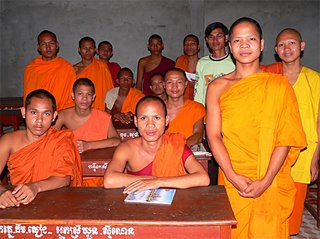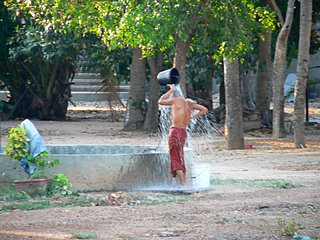Saturday, March 25, 2006
No 1 English teacher

 I wrote a few weeks back about the monks' class being a little subdued compared with my other English class. There have been developments in the time since I wrote that.
I wrote a few weeks back about the monks' class being a little subdued compared with my other English class. There have been developments in the time since I wrote that.I was allowing myself to loosen up a little, going into crazy storytelling mode from time to time and invited the monks to do likewise. 'Not appropriate for monks' was the answer I was given.
However, as we get to know each other they have become much looser and we have many jokes together. We are not following a published course but I do use lessons that I am able to download from the internet. http://www.english-to-go.com/ The monks tend to set the course of discussion that goes much wider than the materials presented. I guess the questions stem from their reading. 'Please explain the meaning of "rally" and "gather" ' for example. The favourite topic so far seems to be sexual practices in Western countries. I think they were quite shocked when I suggested there was no value for a man in marrying a virgin.
I asked them if our topics were appropriate for monks. The reply came, 'We can discuss anything.' He didn't need to add, 'We just can't do anything.'
Recently we were doing an exercise in relation to a newspaper article that required them to put a list of events in order. After they had been working on this for some time I asked, 'What is number one?'
The reply came in a rather dry tone, 'A condom.'
Some of the others laughed a little but I had difficulty controlling my laughter. He was right, of course, Number 1 is a popular brand of condom in Cambodia. I had seen the posters advertising them.
* * *
The monks have invited me to stay at Wat Xam either permanently or overnight. But perhaps I am still addicted to my relative luxury. While compared to most of my family and friends back in Australia I live very simply and frugally, to the monks I am rich.
'Do you have a fan?' I asked last time they invited me.
'No.' Temperatures here have recently been reaching about 37 C. I doubt that their rooms are as well ventilated as mine. They are probably smaller than mine. And yet they sleep without the benefit of a fan.
They bathe communally and in public, drawing water from a well, while I have my own personal bathroom with running water and a shower. Sure I have no hot water but with the present temperature range it is entirely superfluous.
Yes indeed, I am rich.
* * *
Many monks manage to improve their vocabulary by reading in English. This does not necessarily help their pronunciation. They often say to me, 'Can you explain the word "xyzxyz"?' That might as well be what they say. It is often impossible for me to guess what it is they are saying.
'Can you spell it?' I ask and write it on the board. Sometimes the spelling is wrong too but we are getting closer.
When I did this process a few days ago the word I got on the board was 'psychiatrist'.
I demonstrated the correct pronunciation and was then asked, 'What is a psychiatrist?'
Another quickly answered 'a doctor for crazy people'.
Often their explanations are simplistic and I try to discourage their use of derogatory words. (They didn't know what the word 'derogatory' meant two weeks ago.)
'Not everyone who visits a psychiatrist is crazy,' I say.
'Is a psychiatrist someone who treats people with downs syndrome?' They have some knowledge of downs syndrome because there are a few such people in town. However, my experience is that locals write these people off by saying, 'He crazy.'
'Not necessarily,' I answer. 'Downs syndrome is not just related to the brain. And most psychiatrists treat normal people who happen to have a mental illness.' I find it difficult to explain simply.
They do not seem to understand that otherwise 'normal' people might have a mental illness. I decide to start with something they know.
'The Buddha told us that we all experience dukkha (suffering and the general unsatisfactoriness of existence). It is not just poor people who experience dukkha. Rich people also have dukkha. Even the richest person in the world has dukkha.'
Some of them look at me strangely. I find many people here, including one or two of the monks, believe that if they were rich all their problems would be gone. This suggests they do not understand the point of what the Buddha was saying.
'So we take a person in Australia or some other Western country. They have a good husband or wife. They have a nice home. They have a job. They have everything in life that a Cambodian might think a person could want to make them happy. And yet they still experience dukkha.
'Many people find this hard to understand and they become very sad. When this sadness persists doctors call it "depression". Depression is one of the mental illnesses that are often treated by psychiatrists.
'People learn to cope with depression in different ways. Some go to the doctor and get a drug that makes them feel happy. Some drink alcohol and get drunk every night. But the drug and the alcohol do not take the depression away. If the person stops taking them the depression returns.'
We are moving towards some understanding. It is hard to explain something that is so far outside their world. Sadly, as their world becomes more like ours, I expect they too will discover depression and the many ways of attempting to cope with it.
* * *
Often I sit in my room and think about the poverty of the people here. Invariably tears come to my eyes. I am only one person. There is so little I can do.
I once met a woman who had worked as an Engish teacher in developing countries. She told me that she could not cope with Cambodia. The poverty was too great. She simply could not stand to see it on a daily basis. She had to leave.
I try to keep this blog fairly light. I write about the more pleasant aspects of my life here. You might get the idea that this is paradise. But I have my challenges. There is dukkha for me too. When the going gets tough I think about the poverty of the people I talk to every day. I think about their friendliness, cheerfulness, generosity and their ability to keep going despite their hardships. Tears roll down my cheeks. And then I get on with what I came here to do.